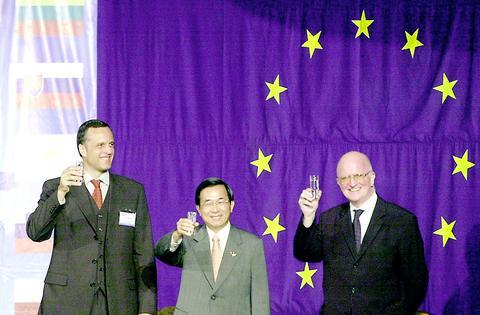President Chen Shui-bian (
"We have realized that following the further integration and expansion of the EU, the union in the future will play a much more important role in international affairs, including in the Asia-Pacific region," Chen said when addressing the annual Europe Day dinner hosted by the European Chamber of Commerce Taipei (ECCT) yesterday.

PHOTO: SEAN CHAO, TAIPEI TIMES
Saying that the significance of the EU's integration inspired his inauguration speech on May 20, Chen said that the success of the EU, which was developing based on respect for the self-determination of individual countries, has structurally affected the principle of national sovereignty and challenged traditional notions of national boundaries.
Chen said that Taiwan values democracy, human rights and peace, which the EU also consistently values, for creating regional stability and development, and he expected the EU would contribute its experience and achievements to the Asia-Pacific region.
"I sincerely expect that members of the EU can enhance their role by facilitating democracy and human rights in Asian countries, ensuring peace in the Taiwan Strait and the Asia-Pacific, as well as giving more support in assisting the 23 million people of Taiwan in participating in international events and organizations," Chen said.
Chen also said he deeply regretted seeing the EU vote in opposition to Taiwan's eighth bid to join the World Health Organization (WHO) earlier this month.
"Taiwan has spent 12 years trying to become a member of the World Trade Organization [WTO]," Chen said.
"We hope that the EU in the future can be rid of political pressure and add its strong support to allow the 23 million people of Taiwan to enjoy the universal values of the WHO, including basic human rights and medical cooperation, hygiene and epidemic prevention with the rest of the world," Chen said.
The president congratulated the expansion of the EU into Eastern Europe by successfully inviting 10 more countries to join it, saying that Taiwan should grab such an opportunity to create not only commercial and technological cooperation but also diplomatic relations.
"While Taiwanese businessmen are endeavoring to march into all of Europe, we should encourage our business leaders to enhance their investment in Central and Eastern Europe to facilitate relations between Taiwan and those countries, especially in the fields of political, cultural and economic activities," Chen said.

FALSE DOCUMENTS? Actor William Liao said he was ‘voluntarily cooperating’ with police after a suspect was accused of helping to produce false medical certificates Police yesterday questioned at least six entertainers amid allegations of evasion of compulsory military service, with Lee Chuan (李銓), a member of boy band Choc7 (超克7), and actor Daniel Chen (陳大天) among those summoned. The New Taipei City District Prosecutors’ Office in January launched an investigation into a group that was allegedly helping men dodge compulsory military service using falsified medical documents. Actor Darren Wang (王大陸) has been accused of being one of the group’s clients. As the investigation expanded, investigators at New Taipei City’s Yonghe Precinct said that other entertainers commissioned the group to obtain false documents. The main suspect, a man surnamed

DEMOGRAPHICS: Robotics is the most promising answer to looming labor woes, the long-term care system and national contingency response, an official said Taiwan is to launch a five-year plan to boost the robotics industry in a bid to address labor shortages stemming from a declining and aging population, the Executive Yuan said yesterday. The government approved the initiative, dubbed the Smart Robotics Industry Promotion Plan, via executive order, senior officials told a post-Cabinet meeting news conference in Taipei. Taiwan’s population decline would strain the economy and the nation’s ability to care for vulnerable and elderly people, said Peter Hong (洪樂文), who heads the National Science and Technology Council’s (NSTC) Department of Engineering and Technologies. Projections show that the proportion of Taiwanese 65 or older would

Democracies must remain united in the face of a shifting geopolitical landscape, former president Tsai Ing-wen (蔡英文) told the Copenhagen Democracy Summit on Tuesday, while emphasizing the importance of Taiwan’s security to the world. “Taiwan’s security is essential to regional stability and to defending democratic values amid mounting authoritarianism,” Tsai said at the annual forum in the Danish capital. Noting a “new geopolitical landscape” in which global trade and security face “uncertainty and unpredictability,” Tsai said that democracies must remain united and be more committed to building up resilience together in the face of challenges. Resilience “allows us to absorb shocks, adapt under

Taiwan Semiconductor Manufacturing Co (TSMC, 台積電) yesterday said it is building nine new advanced wafer manufacturing and packaging factories this year, accelerating its expansion amid strong demand for high-performance computing (HPC) and artificial intelligence (AI) applications. The chipmaker built on average five factories per year from 2021 to last year and three from 2017 to 2020, TSMC vice president of advanced technology and mask engineering T.S. Chang (張宗生) said at the company’s annual technology symposium in Hsinchu City. “We are quickening our pace even faster in 2025. We plan to build nine new factories, including eight wafer fabrication plants and one advanced